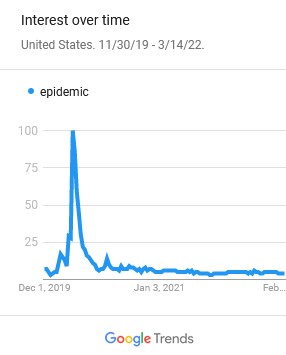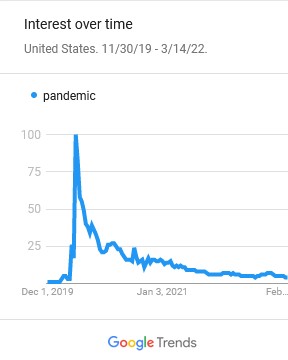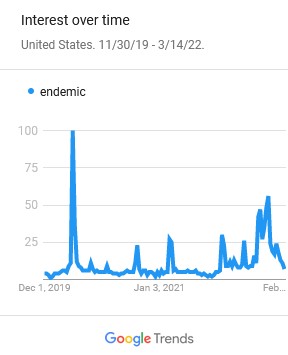Following on from yesterday’s blog, a variation of the word “Endemic” has appeared. Spelled out as “End-demic,” this is a play on words to mean the pandemic is over, life has gone back to normal, and the virus has become endemic, meaning it’s prevalent in society but not disruptive to people’s lives and most individuals have developed immunity to Covid-19 or been vaccinated against it.
The term is too new to have appeared in Google Trends or the Urban Dictionary or any dictionary for that matter but it has appeared in a few online articles, usually within the title. Here are a few examples:
Ian Mount, a writer for Fortune.com, wrote an article on January 11, 2022 entitled “Spain suggests a radical ‘end-demic’ approach to Omicron: Just treat it like the flu.”
An article published on January 13, 2022 for the website SeekingAlpha was entitled “Wall Street Breakfast: End-Demic.” It poses the question “How and when will the pandemic be over?”
On February 21, 2022 an article entitled “Working Towards The “End-Demic” was published on TotalFood.com. In writing for the restaurant industry, the author says “With an eye towards what we are calling the ‘End-Demic’ there is cause for restaurants and operators to be cautiously optimistic. The industry has survived two years that many could never imagine. Many of these strategies we used as an industry will serve a building blocks for the restaurant industry’s future” (TotalFood.com).
A tweet from KFBK News Radio featured a poll asking readers if they think it’s time to consider the Covid-19 pandemic as an “end-demic. 88% of respondents said “Yes.”
The term “end-demic” appears on apparel. Online store RedBubble.com is selling T-shirts with an “End-demic” motif.

And finally, never let an “End-demic” go to waste. One UK company created an End-Demic Party website, selling party favors and decorations. The theme reflects the mood of those who yearn to go out and celebrate with family and friends after spending over a year cooped up in lockdown and quarantine.
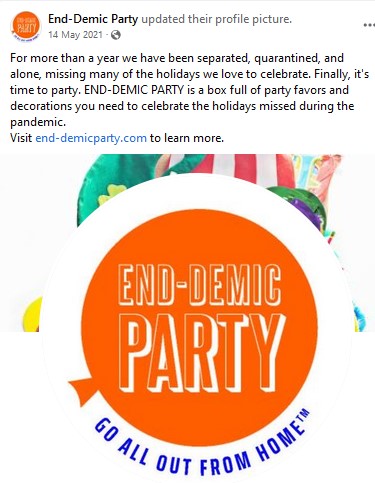
Social Media Trends as of May 17, 2022
Facebook #enddemic: people are posting about this
Instagram #enddemic: 38 posts
TikTok #enddemic: 16,300 views
YouTube #enddemic: less than 100 videos and channels
Google Trends: enddemic appeared as a blip in March 2020 and peaked during the week of January 16, 2022 as people were hoping that the pandemic was in its endgame.
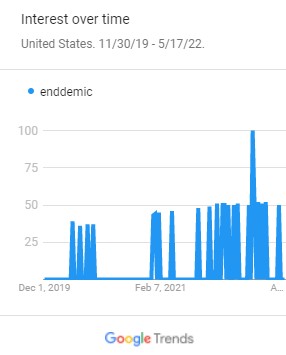
Sources:
“End-demic” motif. RedBubble.com. URL: https://www.redbubble.com/i/t-shirt/End-Demic-by-ArtToons/50244261.FB110.
“End-Demic Party.” End-Demic Party. 23 May 2021. URL: https://www.facebook.com/putski77.
“John McGinness Poll Question.” Twitter.com. KFBK News Radio. February 1, 2022. URL: https://twitter.com/kfbk/status/1488639156066549761?ref_src=twsrc
%5Etfw%7Ctwcamp%5Etweetembed%7Ctwterm%5E1488639156066549761%7Ctwgr%5E%7Ctwcon%5Es1_&ref_url=https%3A%2F%2Fkfbk.iheart.com%2Ffeatured
%2Fjohn-mcginness%2Fcontent%2F2022-02-01-mcginness-poll-question-should-covid-be-considered-an-end-demic-yet%2F.
Meister Seelig & Fein LLP. “Working Towards The ‘End-Demic.’” TotalFood.com. February 21, 2022. URL: https://totalfood.com/working-towards-the-end-demic/.
Mount, Ian. “Spain suggests a radical ‘end-demic’ approach to Omicron: Just treat it like the flu.” Fortune.com. January 11, 2022. URL: https://fortune.com/2022/01/11/flu-omicron-spain-eu-covid-endemic/.
“Wall Street Breakfast: End-Demic.” SeekingAlpha.com. January 13, 2022. URL: https://seekingalpha.com/article/4479475-wall-street-breakfast-end-demic.
